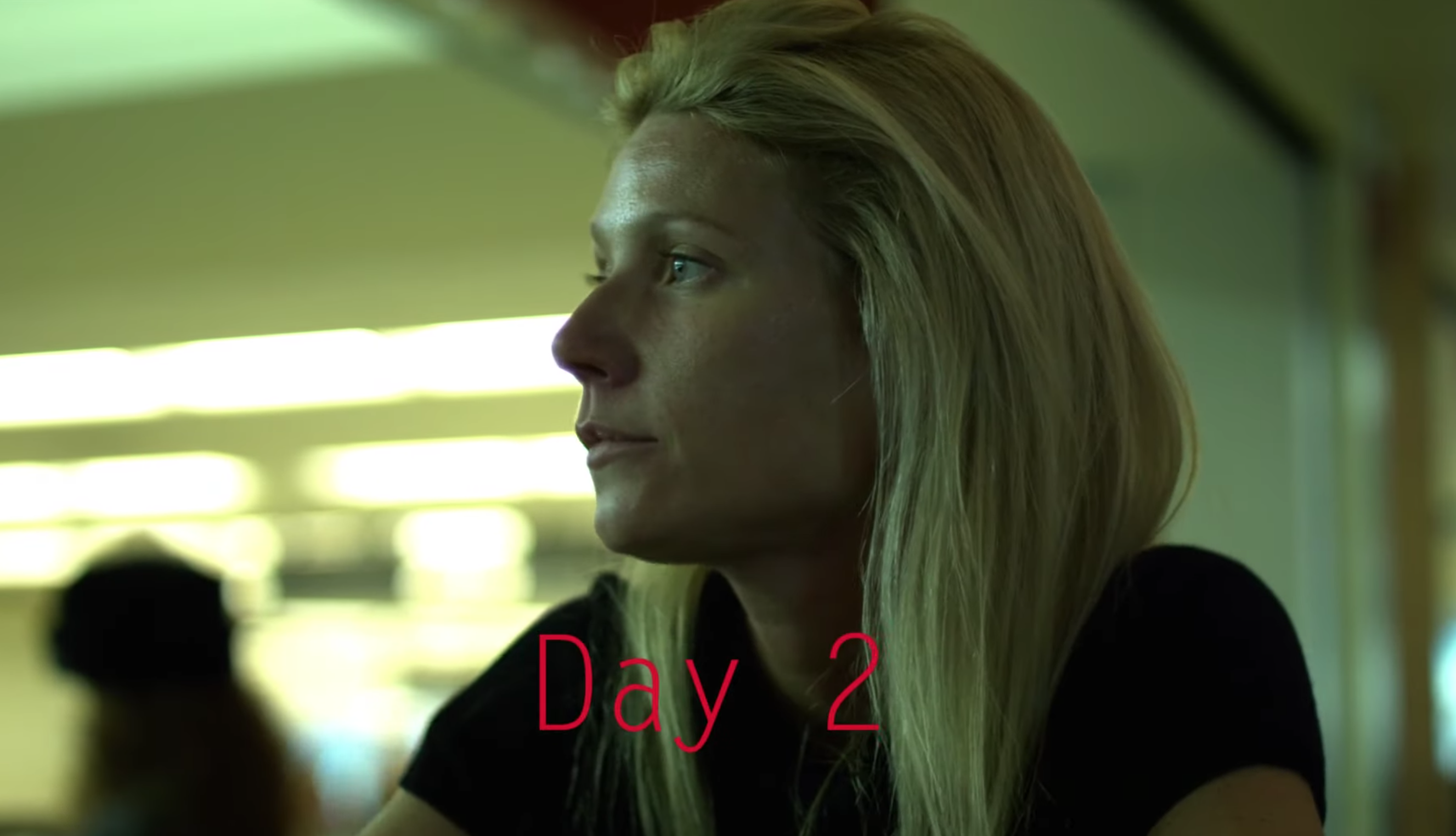From MOMA curator Dave Kehr, a 1902 short called The Flying Train. It depicts a ride on a suspended railway between the towns of Barmen and Eberfeld, Germany, which are due east of Dusseldorf. Shot on Biograph’s proprietary 68mm stock, which obviously “affords stunning visual clarity and quality, especially compared to the more standard 35mm or 16mm stocks,” etc. Twelve years before the start of World War I.
Goo-Goo Eyes For Cameron Crowe
I fell hard for Cameron Crowe‘s Almost Famous nine or ten months before it opened in September 2000, or when I came across a 1998 draft of the script (called “Untitled”, 168 pages). I didn’t just like or admire it — I was blown away, head over heels.
I was generally delighted with the film but it didn’t get me off like the script did because it felt a little too compressed here and there. It ran 122 minutes, in part because Dreamworks producer Walter Parkes kept insisting on “shorter, shorter, shorter.” Plus the film didn’t include a “Russell Hammond confesses all to Rolling Stone editors” scene that I thought was perfect.
I’ve had Almost Famous on my best of the 21st Century list for two decades now as it’s 90% of a great film, but I didn’t completely tumble until the 162-minute “director’s cut” bootleg Bluray came out in 2011.
I attended a big Almost Famous press shebang during the 2000 Toronto Film Festival, and a moment from that event is burned into my memory. I was shuffling into the main restaurant where the party was taking place, and in a center booth I saw L.A. Times critic Kenneth Turan chatting with Crowe and then-wife Nancy Wilson. And I was almost startled by a look in Turan’s eyes — a look of absolute rapture that reminded me of a ninth-grader swooning over his prom date and dreaming about some act of exquisite erotic kindness that might be in the offing later that evening.
Turan, in short, was making goo-goo eyes at Crowe…talking to the man of the moment was filling him with awe and joy and ecstasy, and his eyes…his eyes were doing ring-a-ding-ding backflips. Turan was in love…completely fluttering with feeling.
And at that very moment I made a mental note to myself, to wit: “Don’t ever give anyone slavish goo-goo eyes for any reason or under any circumstance…show respect and admiration but keep your cool…hold on to your dignity. Because if you don’t show a modicum of restraint the filmmaker will remember those goo-goo eyes, and if you don’t goo-goo him the next time he’ll know you don’t like the new film as much as the older one, or he’ll conclude that you were being a phony the first time.”
Let this be a lesson to us all. The next time you find yourself chatting with someone you genuinely admire, don’t flash the goo-goo eyes!
23 and 1/2 Weeks Ago
Please reconsider the way things stood on Tuesday, 2.25.20. Five and 1/3 months ago, give or take. The post was titled “Don’t Stand So Close To Me,” and it contained the very first photo of a Hollywood-centric journalist in any country or on any coast wearing a mask. I distinctly remember a longtime publicist friend remarking on Facebook that the mask photo had taken things a bit far, and my replying that I had done so with a humorous attitude. Not so funny two or three weeks later!
And please look at the world infection map that was current back then. Almost all of it in Asia and Italy. And please take special note of the comments from that malignant asshat Mr. F. who accused me of being panicky [after the jump]. And Mr. Sunset Terra Cotta saying that the situation was being exacerbated by “an alarmist, pathologically dishonest news media. Fortunately we do have that.”
My response to accusations of pandemic paranoia was that “an ounce of prevention is worth a pound of cure. If you’re walking along 23rd Street during a Manhattan snowstorm, is it ‘freaking out’ to sidestep a big slush puddle? Have you looked at all the photos of people in Venice and Milan wearing facemasks?”
“Don’t Stand So Close To Me“, chapter and verse: “And let’s not shake hands, just to be on the safe side. And don’t cough in my vicinity. But man, I really hate the idea of wearing a surgical mask. By the way: Now is the time to book airfare to and hotels in Venice, Milan, Lombardy and Veneto.”



Up Kirkwood to Appian Way
Late yesterday afternoon we did a modest 75-minute hike. Huffing and puffing up Kirkwood (35 degree uphill incline), and then a hard right on Appian Way. Pretty much the highest point in the hills. Clean air, blue sky, nice feeling.



Less Than Meets The Eye
I re-watched Robert Zemeckis and Tom Hanks‘ Cast Away last night. I’d seen it only once before, when it opened 20 years ago. All this time I’ve been nurturing favorable recollections, or at least a pleasant notion that it was a better-than-decent film. I have to say that I now regard Cast Away as handsome, ambitious and certainly well-produced, but generally unexceptional or just, you know, “agreeably meh.”
It would have been so much better if Hanks hadn’t shouted “Wilson!” about 385 times. I literally sat up on the couch last night and said to the TV, “Good God, will you shut the hell up?” I’m not talking about Hanks’ character loving and needing a beat-up, blood-spattered volleyball as a companion — that part’s fine — but hearing that name shouted over and over and over is infuriating.
And that moment when Hanks’ married ex-girlfriend (Helen Hunt) faints dead away when she’s told that he’s been rescued…terrible.
The final scene has a nice aura but it doesn’t really “say” anything except “okay, you’re a survivor…alive and relatively young so where do you want to go?” Almost every alert person on the planet earth faces the same question each and every day…no? But when you think about it the ending doesn’t really connect with Hanks’ character or what he’s gone through…it feels like a moderately profound moment but there’s no connective tissue that relates to the substance of the film. It’s just nicely shot and scored and visually pleasing with the vast West Texas flatness. It would’ve been so much better without that pretty girl pulling over in her pickup truck and asking if he needs help, etc. Pretty girls don’t do that…sorry.
That third-act scene in which Hanks and Hunt acknowledge their still-intense love but nonetheless agree to part ways during an evening rainstorm? Probably the best moment in the whole film.
$400 Rather than $600…
…in weekly unemployment supplements until the end of the year, according to Trump’s just-announced executive order. Does he have the real-deal authority to ensure this, or is this just bullshit grandstanding?
Postal Vote Suppression in Plain Sight
Last night Orange Plague and his stooge, Postmaster General Louis DeJoy, began to blatantly finagle in order to interfere with postal voting in the 11.3.20 election. They’re trying to make it as difficult as possible for Average Schmoes to vote for Biden, and for the post-election count to be as slow and challenge-able as possible. This is a bully dictator move, and it’s 100% real.
DeJoy unveiled “a sweeping overhaul of the nation’s mail service, displacing the two top executives overseeing day-to-day operations,” according to an 8.7 Washington Post story by Jacob Bogage. “The shake-up came as congressional Democrats called for an investigation of DeJoy and the cost-cutting measures that have slowed mail delivery and ensnared ballots in recent primary elections.
“The #USPostalService helped build this country by uniting Americans in the biggest cities, smallest towns, and most remote rural areas,” said PFAWF President @BenJealous. "Especially now, across America, we need our Post Office." #DefendOurPostOffice during #coronavirus. pic.twitter.com/85XOkedt9R
— PFAW (@peoplefor) August 3, 2020
“Twenty-three postal executives were reassigned or displaced, the new organizational chart shows. Analysts say the structure centralizes power around DeJoy, a former logistics executive and major ally of President Trump, and de-emphasizes decades of institutional postal knowledge. All told, 33 staffers included in the old postal hierarchy either kept their jobs or were reassigned in the restructuring, with five more staffers joining the leadership from other roles.”
From 8.8. N.Y. Times report, “The Voting Will End Nov. 3 — The Legal Battle Probably Won’t“: “A greater reliance on mail-in voting [due to COVID] could prolong the counting in a way that turns Election Day into Election Week or Election Month. And the atmosphere has been inflamed by a president who is already using words like ‘coup,’ “fraud” and “corrupt” to delegitimize the vote even before it happens.”
Nobody Wants To Remember Clinton-Kaine
I for one completely sympathize with Maureen Dowd‘s mistaken conveyance in her latest column, “No Wrist Corsages, Please.”
She wrote about Joe Biden‘s stated intention to choose a woman (and probably a non-Anglo) as his vice-presidential running mate, and the fact that 36 years have passed since a Democratic presidential candidate selected a woman in this capacity (i.e., Walter Mondale + Geraldine Ferraro). But in the initial version Dowd wrote that it had been 36 years since a man and a woman had run together on a Democratic Party ticket.
Dowd forgot, in short, that Hillary Clinton and Tim Kaine ran against Trump-Pence in 2016.
But who can blame her? Has there ever been a blander and more forgettable vp wannabe than Kaine? Not to mention the fact that Clinton all but ensured her defeat by alienating the Bernie Bros and Jill Stein fringies when she chose Kaine instead of a vigorous progressive (like Elizabeth Warren) as her running mate. She was so fucking blind to what the electorate was screaming for in ’16 (“shake it up…jettison the usual usual”) that she chose a go-along, do-no-harm moderate liberal like Kaine. And in so doing she gave us Donald Trump.
In other words Dowd’s mind rejected the memory of the Clinton-Kaine catastrophe because it was too painful. I get it. I understand the syndrome.
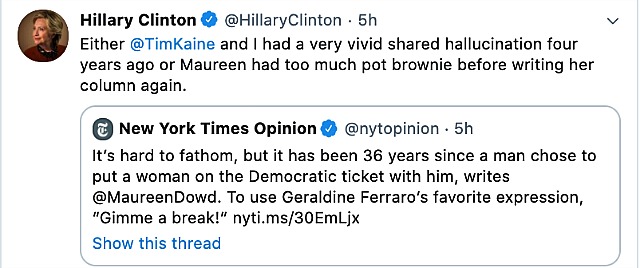
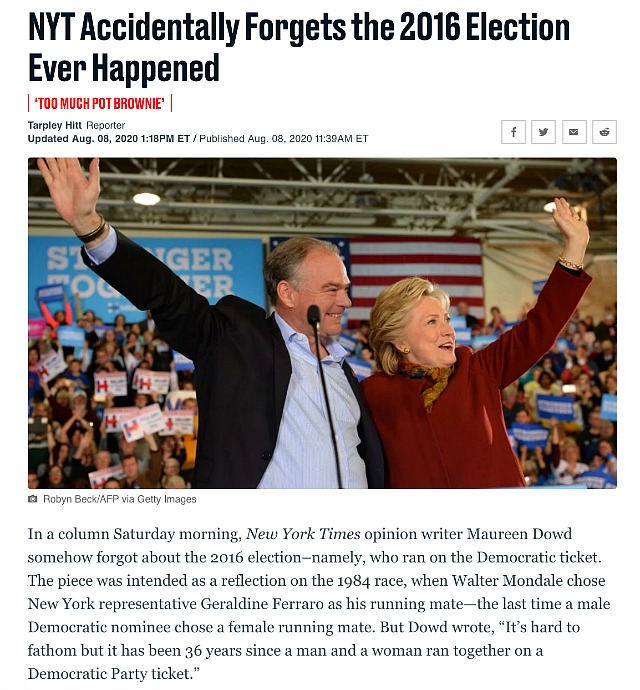
Cancel Shia LaBeouf For Brownfacing?
I finally forced myself to watch David Ayer‘s The Tax Collector…yeesh. Not by any stretch a career highlight for Ayer, whose best effort as a director-writer so far has been Fury, which I didn’t even care for all that much. Mostly an ultra-violent wallow, like everyone has said. What a hellish realm. Hit me over the head with a shovel.
But I didn’t mind Shia LaBeouf‘s “racist” performance as Creeper, a psychopathic collection guy working for Jimmy Smits‘ crime lord, “Wizard.” At the very least he’s delivering with a certain impudent energy mixed with a willingness to die on the spot.
We all understand the rule about white guys not being allowed to portray POCs and cisgenders not being allowed to play trans folk, but there’s a part of me that admires the “fuck you” attitude that Ayer and LaBeouf obviously embraced in creating this particular “Creeper.”
I think any actor should be allowed to portray any character of whatever ethnic stripe. It all boils down to “can you sell it…can you be it…do you have the bravery and conviction?”
In other words, I was kidding when I wrote the headline for this post. I was pretending to be a wokester asshole.
Five or six days ago Indiewire‘s Eric Kohn accused LaBeouf of giving “a cartoonish and culturally insensitive performance” that amounted to “a two-bit Latino burlesque.”
Last month Ayer said on Twitter that LaBeouf wasn’t delivering a “brownface” parody but playing “a white character who is influenced by latinx culture. Which is a really important answer. Shia is playing a whiteboy who grew up in the hood. This is a Jewish dude playing a white character. Also the only white dude in the movie”.
But again, the idea of LaBeouf tattooing his entire chest and stomach area for this role….what an asinine thing to do! What a way of spitting upon your God-given biological temple.

Bret Maverick
I sauntered over to Urth Caffe this morning for a couple of large cappuccinos. I gave my order to a short Latina named “H. Celso.” She asked for my name and I said “Jeff.” I didn’t slur or mutter it — I said my name as plainly as a Kansas wheat farmer saying the word “fence.” Naturally she misheard and wrote “Bret” on the order ticket. Which of course was my fault because WHITE GUY.
Five or six minutes later a young Latino waiter was roaming around with two large cappuccinos and calling out “Brad? Two cappuccinos…Brad?” I went up to him and said, “Uhm, I may have ordered these but my name is Jeff, not Brad.” He took my word for it.
H. Celso’s order ticket told me about the “Bret” misunderstanding. My hearing “Brad” rather than “Bret” when the waiter called it was, no kidding around this time, definitely my fault. His pronunciation of “Bret” became “Brad” to my ears, what with the clatter of the cafe and the waiter’s lack of interest in emphasizing a hard “t” sound after the first three letters.
The last time I even heard “Bret” was 26 years ago, during that Pulp Fiction scene when John Travolta and Samuel L. Jackson pay a visit to the apartment of Frank Whalley‘s “Bret” (technically spelled “Brett” on the Wikipedia page) and his young pallies. Correct me if I’m wrong but the first Bret in the history of U.S. entertainment industry was James Garner‘s gambler character on the original Maverick series, which ran on ABC between ’57 and ’62.

“Contagion” Again
Tatiana had never seen Contagion so we watched it last night — my fourth or fifth time, but God, such a brilliant film, and so far ahead of the curve it wasn’t funny. It did fairly well financially, but it failed to catch on as a Best Picture contender. It should have. It didn’t predict the future — it knew it cold. This message appears at the very end of the credits:

“Contagion Reboot,” posted on 11.19.11: Last night Warner Bros. publicity made a spirited, gung-ho attempt to re-launch Steven Soderbergh‘s Contagion among award-season cognoscenti and to put it into “the conversation,” so to speak. They invited journos like myself to a pleasant, talent-populated soiree (Soderbergh, Benicio del Toro, Garry Shandling, Contagion producers Michael Shamberg and Stacey Sher, screenwriter Scott Burns) inside the Clarity lobby-rotunda, and followed this with a screening of the film.
The pitch was basically “this is an undeniably gripping, highly intelligent, superbly-made socio-political-scientific thriller“” — no argument from me — “so why isn’t it being mentioned a bit more in terms of awards chatter, best-of-the-year lists and so on?”
The best response I can think of is that Contagion is going on a best-of-2011 list…mine, I mean. My second response is that with Contagion having made about $75 million domestic, what’s the beef? And my third response is that it’s about a subject — social devastation caused by a pathogen — that unsettles people on a very deep level, perhaps more than they know going in, and so I’m guessing they’d rather just leave it at that and not revisit the Contagion reality any more, thanks.
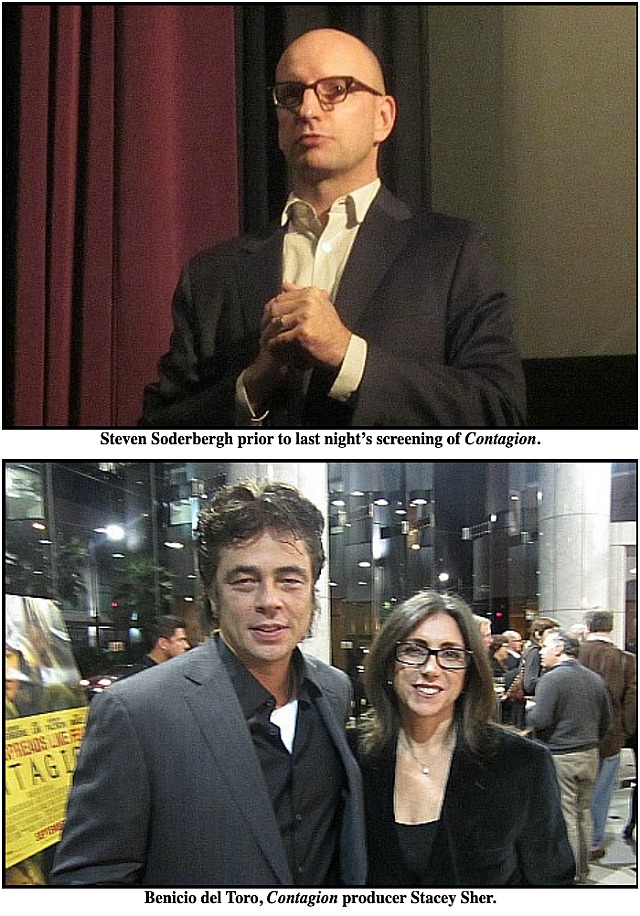
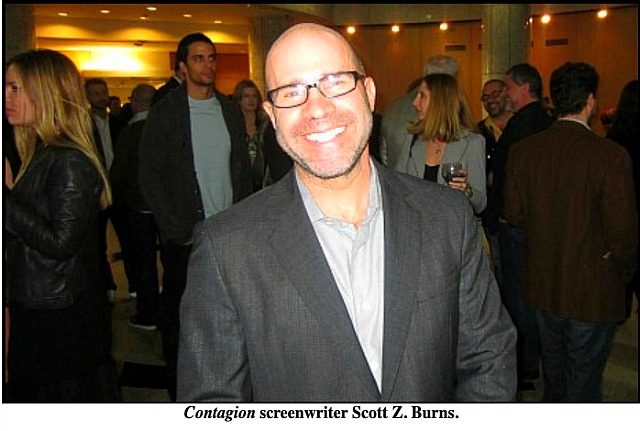
I mean, I was scratching my face all through last night’s screening, and half-wondering if there was something wrong with me because of this, absurd as that sounds. I don’t mind seeing Gwynneth Paltrow die horribly, but I don’t want to go the same way…please.
On top of which Warner Bros. decided to open Contagion in early September. This conveyed to all that (a) they were going for the money (and a $75 million haul is nothing to sneeze at) and (b) the studio felt it was good enough to release in a quality-friendly portion of the calendar but that it wasn’t necessarily an awards contender or they would have opened it in late October or November or December.
There are three other factors: (1) Contagion is an intellectual-technical chiller (as opposed to an emotional drama of some kind) and is therefore regarded as a kind of “genre” film, and that kind of distinction rarely leads to awards chatter; (2) To some extent Contagion is, let’s face it, emotionally dry or reserved, like many of Soderbergh’s films (a quality I’ve always rather enjoyed and in fact praised); and (3) It doesn’t contain one of those thematic echoes or undercurrents that Oscar-season films tend to have, nor does it deliver some basic recognizable truth.
Yes, it says that “it’s entirely possible that millions of us might suddenly die some day due to a runaway virus” but that’s not a basic recognizable truth. If it happens, that would be an anecdotal fact.
Here’s my early September review. I love Contagion. It’s going on my best-of-the-year list, no question. And I especially loved the performances by Jennifer Ehle (her bedside scene with her ailing dad is one of the few genuinely affecting emotional moments), Kate Winslet, Jude Law, Matt Damon, Elliott Gould and Laurence Fisburne. And I can’t wait for the Bluray, and I wish it would be longer when it comes out in that format.







